
17 Oct Interview with Thomas Meier, Director, Liechtenstein Institute
Why is Liechtenstein recognized as a world-class center for research and development?
Liechtenstein is a microstate with around 40,000 inhabitants, which limits our capacity for large research organizations compared to larger countries and research and development hubs in Europe. Our core strength lies in our specializations. Over time, we have excelled in specific industrial research areas such as high-performance drilling machines, advanced audio and visual plug systems and the dental replacement industry. These developments are exemplified by renowned local companies such as Hilti, Neutrik and Ivoclar, to name a few. Our localized focus in the heart of Europe allows us to effectively communicate with surrounding regions, particularly with our friendly neighbors, Switzerland and Austria. On the academic research side, we have three institutions in our country: the Liechtenstein Institute investigates specific topics in history, law, economy and politics; the University of Liechtenstein focuses on architecture, business administration, finance and economy; and the Private University in the Principality of Liechtenstein researches medical sciences and law.
Can you give us an overview of the Liechtenstein Institute’s current role and recent major milestones that mark its importance as a national center for knowledge?
The Liechtenstein Institute was founded in 1986 by former Prime Minister Gerard Batliner and his associates as an independent non-profit research institute. We are a small institution of around 20 contracted researchers including administrative staff. Our annual budget of around 2.4 million Swiss francs is approximately 58% funded by the state and municipalities. We also receive support from private donors and generate income through contracted research and teaching.
We recently celebrated the 100th anniversary of Liechtenstein’s customs union with Switzerland by issuing a detailed historical, political, legal and economic analysis of this topic in a dedicated scientific monography. The customs union with Switzerland has significantly contributed to Liechtenstein’s economic prosperity and quality of life. Our strong relationship with Switzerland over the past century is a key factor in our success. Another key event for the country and the Liechtenstein Institute was marked by the 300th anniversary of the Union of Liechtenstein formed by the Lordship of Schellenberg and the Countship of Vaduz. From a historical point of view, it is worth mentioning that this union, which laid the foundation of our country, occurred near the site of the original oath located next to our institute.
What impact do the Liechtenstein Institute’s studies have on government policy and national development?
We are currently examining the Liechtenstein constitution. We are revising parliamentary laws and regulations and making improvement suggestions to parliament, including when laws have fallen behind times. This ongoing work is essential to our mission. In politics, we conduct ongoing research on referenda. We explore voting behaviors, political opinions of younger versus older citizens and the reasons behind their choices. We send our reports to politicians, the parliament and the government and make them publicly available online and through the local press and media. This allows anyone interested to read our research and use the data to advance their businesses. As a research institute, we prioritize digitizing our output and provide research in both digital and print formats. Our digital publications are typically open access for anyone to read and utilize. Initially, our research was published only in German, which limited its reach. To enhance accessibility, we have begun translating our work into English to make it available to a broader international audience.
How important is achieving national targets for sustainability for both the Liechtenstein Institute and the nation?
Achieving national goals is vital for Liechtenstein, despite its small size of just 160 square kilometers, about 2.7 times the size of Manhattan. While we may not have global significance, we aim to serve as a role model for other countries. We receive strong support for initiatives such as photovoltaics and energy-efficient housing and are positioned as an example for others with similar goals. Compared with larger countries, our small size is a strength when implementing new ideas to reduce carbon footprints and promote sustainability. Our institute of only 20 employees offers financial incentives for sustainable practices such as purchasing electric bicycles for commuting. We are also refurbishing our building to improve its energy efficiency.
How closely does the Liechtenstein Institute work with global research institutions and international partners?
We have several partnerships, primarily with researchers in German-speaking countries and other microstates facing similar research questions. We currently do not have European funding for research such as European Research Council grants as our size makes us less competitive in this system. However, we recently received funding from the European Union through the Erasmus+ program for a project focused on democracy and social life in European small states. We also maintain strong connections with the Ifo Institute for Economic Research in Munich and relationships with other microstates like Andorra and San Marino. We also engage with and foster collaboration with European Economic Area member states. They contribute by collaborating on research publications and participating in symposia to discuss issues relevant to both countries.
What are your top priorities as Director of the Liechtenstein Institute in 2024?
During my time as Chair in Structural Biology at Imperial College London until last year, I learned the importance of developing research organically rather than starting too large. Similarly, the Liechtenstein Institute has grown naturally over the past 40 years to become integrated and recognized within the Liechtenstein community. My goal is to maintain this core strength and expand our collaborations beyond Liechtenstein. We aim to foster partnerships with other small states facing similar research challenges. We have a strong team, and I believe we can achieve our goals.
